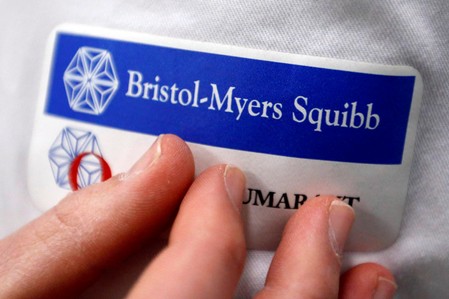About 40% of patients who received a combination of Bristol-Myers Squibb Co’s immuno-oncology drugs Opdivo and Yervoy as an initial treatment for advanced non-small cell lung cancer (NSCLC) were alive after two years, according to data presented at a medical meeting on Saturday.
The combination outperformed chemotherapy as a first-line treatment for the most common form of lung cancer, with 33% of patients who got the older therapy still alive after two years, the company said.
The data was presented at the European Society for Medical Oncology (ESMO) meeting in Barcelona.
Both groups of patients had tumors that expressed 1% or higher levels of the PD-L1 protein targeted by Opdivo, the drugmaker said.
Bristol-Myers also said an exploratory analysis of patients whose tumors had even lower levels of the protein also showed a roughly 40% survival rate after two years, compared with 23% for patients who received chemotherapy.
Opdivo and Yervoy compete with rival drugs from Merck & Co, Roche and others in several types of cancer.
Merck’s Keytruda holds a dominant position in newly diagnosed advanced lung cancer, by far the most lucrative oncology market. The new Bristol-Myers data seems unlikely to significantly alter that position.
Bristol-Myers released top-line results of part of the study in July, showing that Opdivo combined with chemotherapy failed to extend overall survival more than chemotherapy alone in advanced NSCLC. Keytruda plus chemotherapy has shown an ability to extend survival over chemotherapy alone in Merck-sponsored lung cancer trials.
Separately, Bristol-Myers released five-year survival data for patients with advanced melanoma – the deadliest form of skin cancer – treated with its immunotherapies.
The New York-based drugmaker said five-year survival rates were 52% for patients who received the Opdivo/Yervoy combination, 44% for Opdivo alone and 26% for Yervoy alone.
Yervoy, one of the first drugs that helps the immune system fight cancer to reach the market, was initially approved for advanced melanoma.
Before immunotherapies became available, the two-year survival rate for advanced melanoma was 5% to 7%, according to Fouad Namouni, head of oncology development at Bristol-Myers.
“I think it shows how immunotherapies are really making the difference in the long term for patient survival,” he said.
(Reporting by Michael Erman; Editing by Bill Berkrot)


